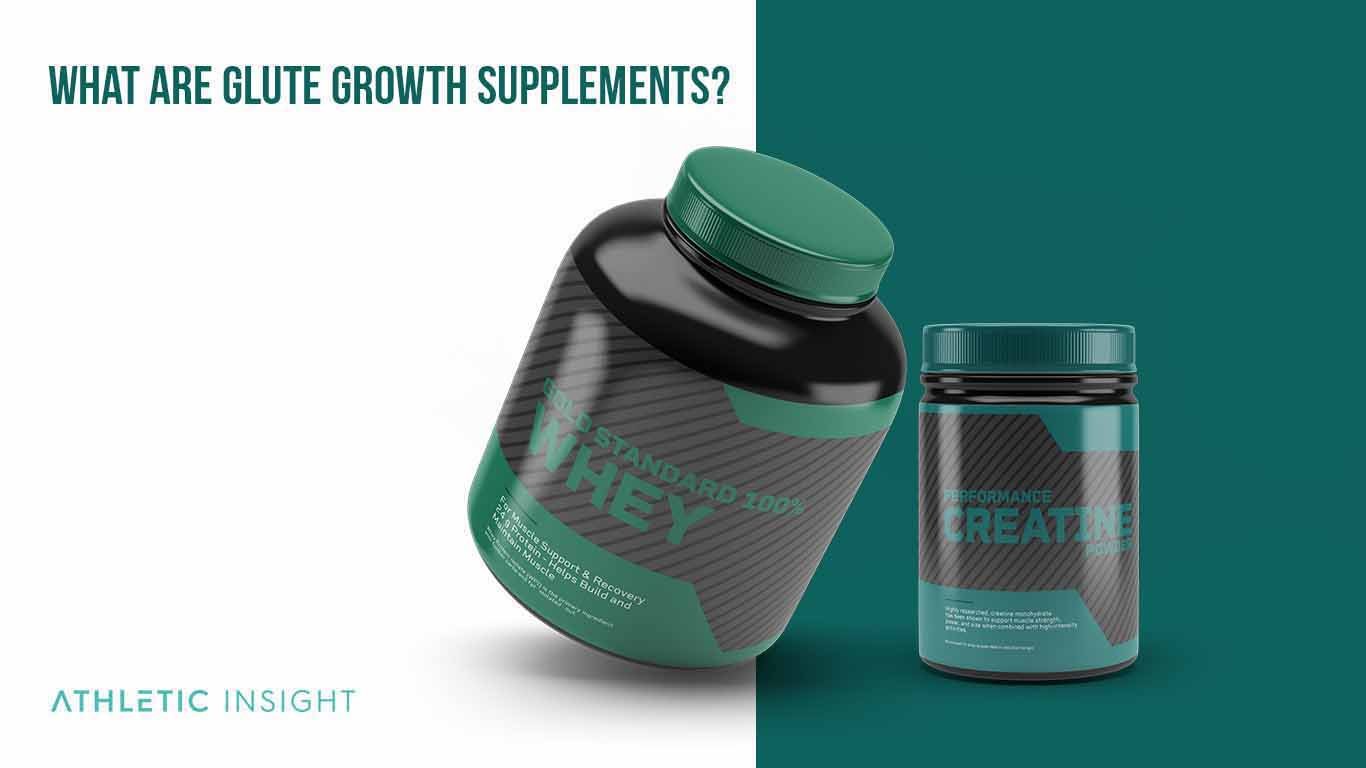The best supplements for glute growth are supplements that improve muscle size when paired with buttock workouts. To determine if a supplement is good for glute growth, it must support muscle growth in general. However, you’ll also want to look at the other muscle-related benefits it can provide, such as providing workout energy during your workout and improving workout recovery while preserving muscle mass post-workout.
When comparing supplements for glute growth, you’ll want to look at the price, ingredients, benefits, and possible side effects. The best glute gain supplements are protein, BCAAs, creatine, and vitamin D3.
- Protein
- BCAAs
- Creatine
- Vitamin D3
Athletic Insight Top 4 Products
- Protein >>> Best Protein Powder Option
- BCAAs >>> Best BCAA Choice
- Creatine >>> Best Creatine Pick
- Vitamin D3 >>> Best Vitamin D3 Pick
1. Protein
When doing exercises for glute growth, the amino acids in protein can help play a role in glute muscle growth, repair, and maintenance. To gain muscle, your body must be able to synthesize more muscle protein than it breaks down.

Doing the correct exercises and consuming one of the best protein shakes for booty gains afterward helps you build and preserve muscle mass. For muscle gain, scientists recommend consuming 0.7-1 grams of protein per pound of body weight.
Protein shakes for bigger butts can help you meet your daily protein intake needs more easily than measuring protein intake in the foods that you eat. If you’re wondering how to make protein shakes for bigger buttocks, it’s easy. Simply add the protein powder to dairy milk, non-dairy milk, or water to create protein shakes for glutes. Or use it to make smoothies for big bums.
Using protein powder for glutes really doesn’t have a lot of side effects, except for upset stomachs for those who have difficulty digesting whey. However, there are other big-butt protein options for lactose-intolerant, vegetarian, and vegan users, such as pea, soy, and hemp protein.
One of the most popular non-dairy booty protein shakes is Thorne’s Whey Protein. It costs around $49 for a nearly 2-pound container and comes in regular flavors like chocolate, vanilla. Most importantly, it is NSF certified.
If you’re looking for more interesting flavors, try Transparent Labs whey protein powder. It costs about $60 for 30 servings and comes in fun flavors. For a vegan protein source, try Ora Organic Protein. At around $40 for 20 servings, it’s a great bargain and the best protein powder for booty gains.
2. Branch-Chain Amino Acid (BCAA)
Branch-chain amino acids (BCAA) include three essential amino acids–valine, leucine, and isoleucine. There’s evidence that BCAA can help build muscle, reduce fatigue, and decrease muscle soreness after glute workouts.
It’s currently uncertain whether taking BCAA before or after your workout gives the best results. However, it can serve as an energy source to help you prolong your glute workout, so taking it before a workout can be to some advantage. Some people simply split the dosage to take one half before and one half after a workout. Research currently suggests taking it within 5 hours of exercise.
BCAA comes in capsules or as a powder that you can mix into water or other liquids. The suggested daily dosage is at least 91 mg of BCAA per pound of body weight. Taking higher doses of BCAA can result in upset stomach, depression, and weight gain, so more is not necessarily better.
You’ll also want to take it over the long term (10+ days) to see significant results in your glutes. Plus, it’s important to take it on non-exercise days as well as exercise days.
Some of the top brands for BCAAs are Thorne, Crazy Nutrition, and Transparent Labs. When choosing a BCAA, make sure to read the ingredients and choose what makes sense for you and your budget.
3. Creatine
Creatine is popular for its ability to provide muscles like your glutes with extra fuel to help you exercise them harder and longer. The extra energy increases glute muscle size, strength, and power. It also helps with improved muscle size, exercise recovery, and reduced muscle fatigue after a glute workout.

While you can get creatine for bigger glutes from animal proteins like beef and fish, taking it as a dietary supplement makes it more convenient and inexpensive.
In high doses, creatine can cause stomach pain, bloating, and diarrhea. These side effects happen to some when saturating muscles during the initial loading phase. Reducing the dosage to less than 10 grams per serving after the loading phase can reduce your risk of side effects.
Creatine most often comes as an unflavored powder that you can mix into your favorite beverage. A normal loading dosage is 20-25 grams split into 4-5 equal doses for 5-7 consecutive days. However, some people skip the loading phase and go straight to the maintenance dosage of 3-5 grams of creatine daily.
There are various types of creatine available, including buffered creatine, creatine hydrochloride, creatine nitrate, and creatine monohydrate. However, creatine monohydrate is the best-studied and appears to be the most effective version.
Starting off the list of creatine choices is Thorne. Thorne creatine contains nothing but creatine monohydrate and is the best creatine for glute growth. Another excellent choice is Transparent Labs Micronized Creatine Powder. It’s keto-friendly and has no extra ingredients. Last is Crazy Nutrition, which contains nothing but creatine monohydrate and comes with no added flavors or sweeteners.
4. Vitamin D3
Studies indicate that vitamin D3 may help to optimize muscle strength, increase muscle protein, and improve type II muscle fibers (30% of glute muscle fibers). Studies also indicate a possible link between lower muscle mass and low vitamin D levels in the body. So, taking vitamin D3 (especially if you’re a woman), may help you improve muscle mass from glute exercises.
The daily recommended allowance of vitamin D3 is 600 IU (15 micrograms). You can increase that amount to 2000-5000 IU for glute muscle benefits. Some people even go for 10,000 IU. The more body fat you have, the more D3 you will want to take.
While you can get vitamin D3 in foods like eggs (40 IU) or salmon (370 IU), taking it as a supplement is usually the best way to get the dosage you need for glute muscle mass improvements. Most people take it in capsule form. However, sublingual drops are also an option since some believe that sublingual liquid D3 is easier to break down and distribute.
There could be some negative side effects from D3, such as shortness of breath, chest pains, muscle pains, vomiting, or weight loss. However, most research supports vitamin D3 as a safe vitamin.
For reputable brands that offer vitamin D3, stick with Thorne, Ora Organics, Transparent Labs and BrainMD. Choose based on your own budget and what you find most important in a supplement.
What Are Glute Growth Supplements?
Glute growth supplements work together with glute workouts for increased glute muscle benefits. Not only do glute growth supplements increase buttock muscle size, but they also have added benefits which may include increased workout energy or improved post-workout muscle recovery.

Why Take Glute Growth Supplements
A supplement for glutes can enhance the results of glute workouts to give you more growth than workouts alone are able to do. So, if you do not see the gains you want from glute workouts alone, taking glute growth supplements is more likely to give you the results you are hoping to achieve.
Who Can Take Glute Growth Supplements?
Glute growth supplements are for both men and women over the age of 18. The glute growth supplements for men are often used to enhance exercise efforts and bulk up. Creatine products are among the most popular muscle growth supplements for male bodybuilders.
Meanwhile, glute growth supplements for women are helpful for improving lean muscle mass. Often, women will choose options that are less likely to increase weight or that can provide additional benefits like vitamin D3.
How to Choose the Best Glute Growth Supplements?
Are you wondering how to choose the best glute growth supplement? Here are some factors to consider when trying to determine how to choose the best glute growth supplement.
- Price: You’ll want to determine how much a monthly supply will cost and match it to your supplement budget.
- Ingredients: If you’re considering a powder, added ingredients and protein sources may be important to you depending on your dietary needs. You’ll want to consider flavors, sugars, protein sources, and your dietary restrictions.
- Side effects: Some supplements for buttocks workouts have more side effects than others, so possible side effects may affect your choice.
- Benefits: Determine which benefits best meet your needs.
What Supplement Helps Most With Glute Growth?
Creatine is the most popular supplement among bodybuilders for muscle growth, including glute growth. One reason it’s popular to use creatine for glute gains is that taking it provides extra fuel for you to continue your exercises longer. The longer you work out, the better your overall muscle gains in size and strength.
You’re more likely to keep up your glute workout routine with its added benefits of exercise recovery and reduced muscle fatigue after your glute workout.
Since creatine supplements for glutes generally come unsweetened and unflavored, you can add them to anything. One of the most popular creatine supplements for glute growth is Thorne’s Creatine Monohydrate.
What Are the Effects of Glute Growth Supplements?
Here are some of the effects of glute growth supplements when combined with glute exercises.
- Building muscle mass
- Increasing muscle protein
- Preserving muscle mass
- Reducing muscle fatigue and soreness
- Providing energy during a workout
Where To Buy Supplements for Glute Growth?
You can buy supplements to increase the size of the buttocks from grocery stores, health food stores, and online. You’re more likely to find protein powders and vitamin D3 at your local grocery store, so a health food store or online shop may be a better choice when looking for creatine or BCAA.
Do you need a prescription for it? Luckily, you don’t need a prescription for any glute growth supplements. However, it’s always a good idea to consult your doctor before using any dietary supplement.
Are Supplements for Glute Growth Expensive?
No, supplements for bigger butts are not expensive. You probably won’t spend much more than $30 a month. For example, you can get a month’s supply of hemp protein for around $24 or a month’s supply of BCAA for around $19.
Do Supplements for Glute Growth Work?
Yes, supplements for glute growth work. The important thing to remember when you take supplements for glute growth is that it’s imperative to add them to a good glute workout routine and to take the glutes supplements over the long term.



